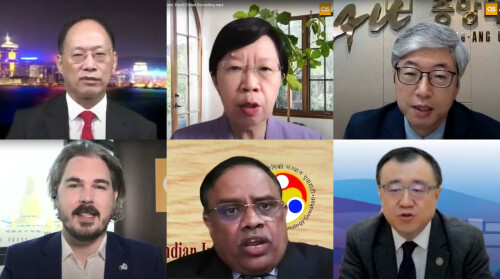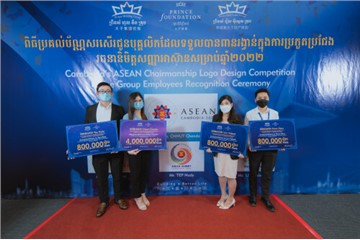
Contents Provided by Media OutReach
HONG KONG SAR - Media OutReach - 2 November 2021 - Distinguished higher education leaders in the Asia-Pacific acknowledged at the Quacquarelli Symonds Asia-Pacific Professional Leaders in Education (QS APPLE) 2021 Conference that the strategic direction of transdisciplinary education and research is fundamental to the development of higher education in the region, and that universities need to become more resilient to cope with technological advancements and uncertainties in the post-pandemic era.

The Presidents Panel of the QS APPLE 2021 Conference featured higher education leaders in the region including (clockwise from top left) Professor Alexander Wai, President and Vice-Chancellor of HKBU; Professor Lily Kong, President of the Singapore Management University; Professor Joonki Paik, Provost and Executive Vice President of Research of the Chung-Ang University in Korea; Professor Yang Bin, Vice President and Provost of Tsinghua University in mainland China; and Professor T.G. Sitharam, Director of the Indian Institute of Technology, Guwahati as panelists; and Mr Anton John Crace, Editor & Programme Designer of QS, as the moderator.
The sector leaders, who joined the Presidents Panel with the theme "Building resilient universities for tomorrow: An Asian perspective" yesterday (1 November) at the QS APPLE 2021 Conference, also agreed that artificial intelligence (AI) will empower both educators and students to cope with future education and workforce trends.
The QS APPLE 2021 Conference, hosted by Hong Kong Baptist University (HKBU) and co-hosted by Prince of Songkla University in Thailand, is being held virtually from 1 to 3 November with the theme "Future Rebalance: Emerging trends and workforce in the Asia Pacific". The conference features more than 80 distinguished speakers from world-leading universities and organisations, and the programme includes keynote speeches, debates, panel discussions and case studies that reflect the opportunities and trends in education in the Asia-Pacific region.
In his opening remarks at the conference, Professor Alexander Wai, President and Vice-Chancellor of HKBU, pointed out that higher education is in the midst of an exciting transformation brought about not only by the pandemic, but also the incredible advances happening in AI and the technology sector. He said that in this fast-evolving world, we need to race against time: "Education is the key to adapting to new technologies, and universities will play a key role in closing an imminent skills gap by enabling their students to acquire transferable competencies alongside technological skills.
"Universities must sow the seeds of systemic change to nurture cultures that emphasise care, collaboration and community engagement if we are to reap the harvest of transdisciplinary research – a rich yield where scientific rigour, societal impact and wider engagement collide," he said.
Ben Sowter, Senior Vice President of QS Intelligence Unit, said: "As a consequence of recent challenges faced, and largely adapted to, by universities, the cat is truly out of the bag – universities can change and they can do it fast. On what other challenges should they next focus their collective might? The primary purpose of this conference is not merely to sustain the conversation, but to evoke action. Beyond action universities might take to reinforce their own resilience as institutions, to what they can do to augment ours as a species."
The Conference's Presidents Panel featured higher education leaders in the region, including Professor Alexander Wai of HKBU; Professor Lily Kong, President of the Singapore Management University; Professor Joonki Paik, Provost and Executive Vice-President of Research of the Chung-Ang University in Korea; Professor Yang Bin, Vice-President and Provost of Tsinghua University in mainland China; and Professor T.G. Sitharam, Director of the Indian Institute of Technology, Guwahati, as panellists.
The panellists shared their visions and experience on how we can build resilient universities in the Asia-Pacific region that can help students flourish in the face of an uncertain future that has been brought about by recent rapid technological advancements and the COVID-19 pandemic. The importance of both natural and social sciences, as seen in transdisciplinary research in terms of addressing grand global challenges, was also ascertained.
"At HKBU, we foster transdisciplinary research with a focus on three areas. The first one is wellness, and it includes health, food, drug discovery and Chinese medicine. Another area is art-tech, which embraces visualisation technologies for traditional art history and culture. All these areas are powered by technologies including AI and big data, which is our third area of focus. We strongly believe that these are the areas which will build students' resilience and prepare them for an unknown future," said Professor Wai.
The Panel discussion also touched on their experience of integrating AI into education programmes, strengthening the AI capabilities of students for the future world of work, and ways to boost internal administrative efficiencies.
Please visit the official website of the conference (https://qsapple.org/) for the full agenda and other information about the event.






















Latest comments